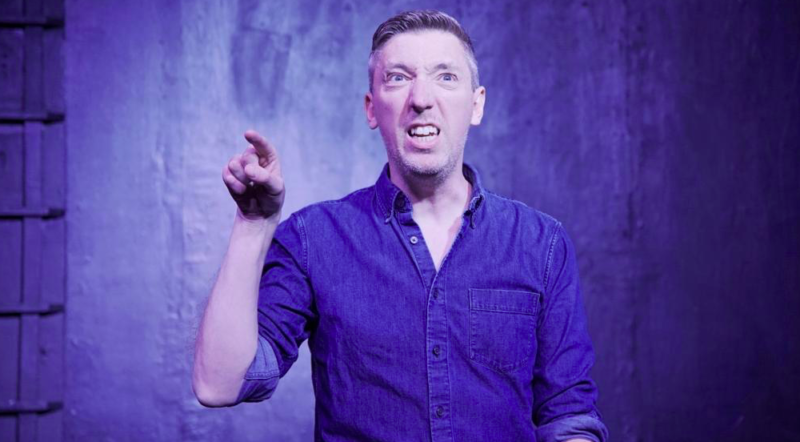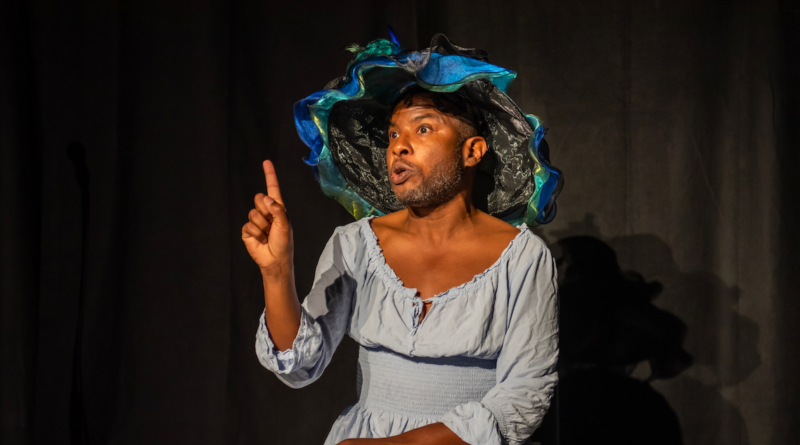INTERVIEW: Queerly Festival is ready to celebrate Pride Month
Photo: The Real Black Swann: Confessions of America’s First Black Drag Queen, written by Les Kurkendaal Barrett, plays June 18, 19 and 24 at the Queerly Festival in New York City. Photo courtesy of the artist / Provided by Emily Owens PR with permission.
The annual Queerly Festival, hosted by FRIGID New York, will kick off June 15 and continue until July 3 as part of Pride Month in New York City. This year’s slate of programming features a number of LGBTQIA+ artists offering their work at UNDER St. Mark’s and The Kraine Theater on the Lower East Side of Manhattan.
The 2023 Queerly Festival begins June 15 with a 7 p.m. performance of Chris Thompson’s podcast-turned play Two Foreskins Walk Into a Bar, which also runs July 1 at 3 p.m. The show follows Thompson as he makes his way to New York City on a journey of sexual liberation and self-discovery, according to press notes. Other highlights of the festival include Transhumance, written and performed by Ania Upstill, an award-winning clown who will take a look at what it means to be a trans human. Another entry is The Drag Album, hosted by Sam Bam Thankyoumaam; this event is a celebration of drag artistry and drag music.
Jimmy Lovett is the festival curator, and they have led the development of this year’s festival from the selection of works to its three weeks of performances later this month. Questions and answers have been slightly edited for style.
What would you say is the ultimate goal of the Queerly Festival? What are you striving for?
The overarching, ongoing goal of Queerly is to provide a platform for LGBTQAI+ artists to present their work without feeling like they have to censor themselves in order to be produced by a heterosexual- and cisgender-centric establishment. A lot of media that centers on queer characters, especially trans characters, is written with an outside point of view in mind, which can be educational for non-queers, but very frustrating for queer people to sit through over and over again.
While we won’t be checking gay cards at the door, I want this festival to feel like a space created by and for our community. This year, we’re especially striving to highlight transgender, non-binary, and gender-nonconforming artists and stories. It’s hard to overstate the physiological toll that the current political climate is taking on trans folks in this country. I want to give my community a moment not only to shine, but also to celebrate each other and be celebrated by our allies.
What are some highlights that you’re most excited for this year?
I’m very excited for our Juneteenth lineup! We’ll be hosting Drag Story Hour NYC in the afternoon followed by two other shows by and featuring Black, queer artists in the evening — Becoming Austin Nation and The Real Black Swann. We’re also teaming up with the theater company What Will The Neighbors Say? to present “Affirm THIS!” A Fundraiser for Trans Liberation on June 27. We’re still working on our final lineup, but we’ve already got some fantastic trans artists on board, including comics, drag performers and musicians. We’ll be raising money for the Trans Formations Project and the Audrey Lorde Project with ticket sales and raffles, and it’s sure to be a fun night for the community.
Are some of the works still being developed, or are these all completed pieces?
We have two readings, Anna May Wong: PERSONA and Love, Chicken, in the festival this year, which I think are still in development. Beyond that, it’s a little hard to say. Personally, I find it almost impossible to know when a work is capital “D” Done, especially with a script. You see it on its feet, and suddenly you have all these new ideas! So, I don’t know where everyone is in their creative process, but most of the pieces are complete — at least in their current iterations.
How do you go about selecting works for the festival?
This year, or rather at the end of last year, we actually had a couple of people contact us about being in the festival, which I was not ready to plan at that point, but I went ahead and made a list and put them on it. Generally, we start with reaching out to a handful of folks who we know or would like to invite back early in the year. We have a show from the FRIGID Fringe Festival, The Parentheses, that won the Queerly Award this March. Past that, we have an open application on our website. This year, a big influence on my choices was that I wanted the festival to be joyful. After everything the queer community has been through this year, I really wanted to give folks a breath of fresh air and a moment to remember that we are a strong and joyful people despite everything that’s happened to us.
In 2023, it seems quite important to produce work by LGBTQIA+ artists. Why is it important for you to produce this work?
The mass commercialization of Pride that we’ve seen over recent years has had a big impact on how people, especially people outside of the community, understand the season. The idea of this family-friendly party has wildly overshadowed the true history of Pride: queer people celebrating their lives and their communities despite ever-present physical and psychological violence against us. From the Stonewall riots (and earlier, often forgotten riots) to the HIV/AIDS crisis, the story of Pride is one of fierce defiance in the face of, at best, indifference and, at worst, death. And that story is still being written.
Pride events are being threatened by hate groups like the Proud Boys here and now in New York City. By presenting this work, we’re able to support the queer community by putting money into queer artists’ pockets, amplifying their voices, and reaffirming FRIGID’s presence as an institution where minority voices are welcomed and sheltered and hate is not. The theater, especially New York City theaters, [has] provided sanctuary for queer folks for generations and been places of community and safe self-expression. For me, it’s an honor to be able to carry on that tradition with this festival — as well as year round as a co-artistic director of FRIGID New York. By doing so we’re not only able to open a window for others to see into our community, which is vital for building empathy and understanding, but also to offer mirrors to queer folks who rarely, if ever, have the chance to see themselves reflected in media and art.
By John Soltes / Publisher / John@HollywoodSoapbox.com
FRIGID New York’s Queerly Festival, curated by Jimmy Lovett, runs June 15 to July 3 at UNDER St. Mark’s and The Kraine Theater on the Lower East Side of Manhattan. Click here for more information and tickets.


